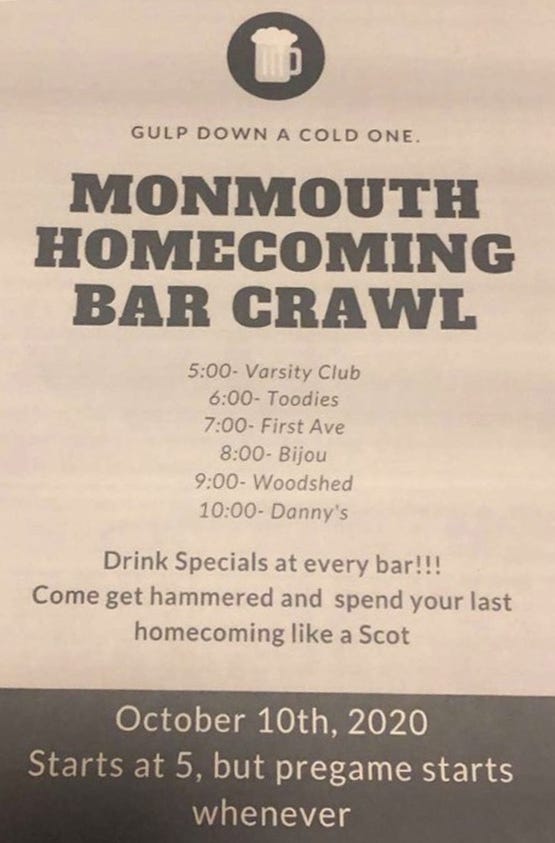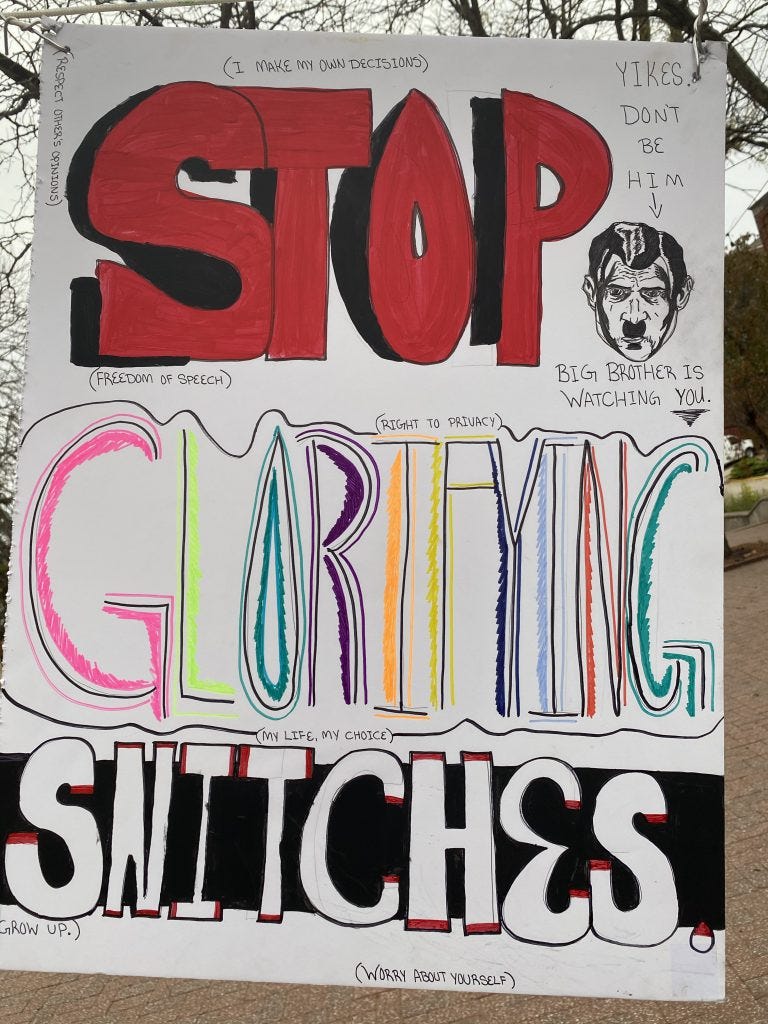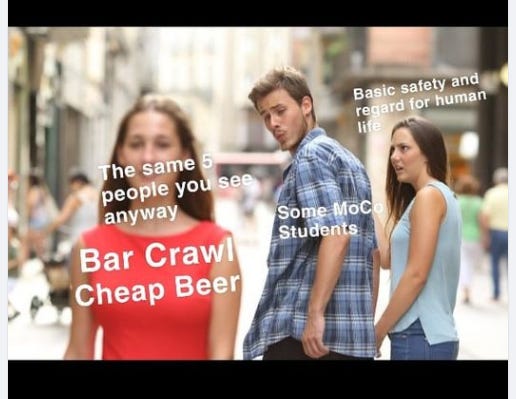Questions about messages and enforcement of Monmouth College COVID-19 policies led to 15 students being disciplined for participating in an off-campus bar crawl that was held over homecoming weekend in downtown Monmouth.
The bar crawl has caused a divide on campus that is struggling to repair itself after weeks of discussions. A main concern from students is the inconsistent communication they feel has come from administration regarding what was acceptable and what was not. Alyssa Miner, one of the 15 students who was handed disciplinary violations for attending the bar crawl, said, “If Dean Salazar would have said there would be consequences. I am sure a lot of us would not have gone.” Likewise, Morgan Kath, another student affected, said, “I think the confusion lies in the email that was sent out, because it never explicitly said do not go to the bar crawl.” Dean Salazar’s email was a prominent example used by students because they felt it was unclear and did not reflect what the college’s true opinion on the bar crawl was. Associate Dean of Students John Salazar replied, “I don't see the inconsistency. One [email] was sent before and one was sent afterwards.” He also felt that the bar crawl could have happened if it was done differently with facemasks and proper social distancing. “What happened could have happened in the right way,” said Salazar. However, he maintains that his email was not intended to be accepting of the bar crawl. “Obviously some students took my email and they didn't make the right call, they did not listen at all.” Students reported feeling unsure of whether the email was accepting of the bar crawl or warning students about its existence. Tyler Halsey, who spoke out against the bar crawl, feels that the college didn’t respond in a timely and efficient manner about the event: “On the administration side of things, I felt like they were too slow in response to [the bar crawl]. They definitely knew about it a few days in advance, at least, and they could have gotten ahead of it better, to do better damage control than they did, because I think they didn’t really do anything really big up front. They were kind of confusing with their wording, especially Dean Salazar’s email – it didn’t send a clear message.”
Claire Harrison, who is a house manager for Alpha Xi Delta, said that she received a separate email concerning the bar crawl that was sent the day of the event: “House managers and residence life got an email from Dean Salazar the day of the bar crawl that attached the flyer. He sent out a literal image of the flyer to residence life staff with the times about where they were going so it almost felt to me like it could be a blank thought, about not realizing what the impact of that could be,” she continued, “I don’t think he’s to blame there in the situation. He has been remorseful since sending that email, because I know that that’s been misread too about his “stay healthy and be safe” [message].”
Many students saw these emails and interpreted them as tacit acceptance where, perhaps, Salazar did not intend for there to be an acceptance of the event. “I trust students, as adults, who have the wherewithal to make good decisions,” said Salazar. “That if you’re given the right information you will make the right call.”
What was seen as a punishment by students who attended the bar crawl and a safety precaution by administration was the quarantine that was handed down to students involved. “He [Dean Salazar] gave us the option to voluntarily quarantine and define us as ‘close-contacts’, or get kicked off campus for the rest of the semester.” said Quin Cutler, another student who was affected by the bar crawl. She said there was a caveat to the quarantine though, “If you got tested and tested negative you could leave quarantine.” This aspect is not in accordance with the Illinois Department of Public Health’s (I.D.P.H.) COVID-19 quarantine guidelines. According to the I.D.P.H. “Since it can take 2-14 days to show symptoms, your last day of quarantine is 14 days from when you were last in contact with the person with COVID-19.” Therefore, testing out of quarantine is not possible. Salazar said that the difference between categories explains the rule of testing out of quarantine. He said that voluntarily quarantined students could test out, but close contacts could not and that does follow the guidelines.
Social media erupted on Friday one day before the bar crawl occurred when Salazar’s email was sent out to the campus community acknowledging that it was happening and telling students to make safe choices. One student tweeted, “Monmouth College may not have been able to prevent people from going to the idiotic bar crawl, BUT the rest of us can absolutely shame you for it if you did go.” With tensions running high on social media and the college’s secret society, the Octopus Society voicing their opinion on the matter via Facebook and multiple flyers hung up in upperclassmen dorms; it was clear the campus was divided.
“I think that because everyone is feeling the pressure of classes, the election, COVID, I think that it has kind of hindered people's ability to pull back and really see others perspectives,” said Morgan Kath. “ I mean look at the state we are in now people are just constantly attacking each other and it’s because we are just mentally so tired that we don’t have the energy to kind of recoil and be like do I need to say this or am I just acting on my strong emotions so I do think mental health wise it has affected what is being put out on social media.”
This social media usage came under scrutiny during the round table event, hosted by Scot’s Senate to give students a platform to raise concerns and talk about their experiences. Tyler Halsey felt that this section of the discussion was “bizarre.” He said, “The Scot’s Senate’s attempt at addressing social media seemed bizarre to me; we are adults. I can say whatever I want to say. It’s the whole point of social media, that I can say whatever I want.” Similarly, Claire Harrison said that, “The twitter conversation part of the round table talk was kind of frustrating to me because I believe that tweets can be negative, that’s true, but people were tweeting things in a way to hold people accountable, not so much to attack and I feel like it was misconstrued in that way. Someone said, “I think people are confusing snitching for civil responsibility.” And I really liked that.” Kylie Monroe says, “Everything has gotten so toxic and I hope things change by the time we come back in the spring.” Alyssa Miner said that if the toxicity doesn't subside by the time next semester rolls around she’ll consider not coming back. This sentiment was echoed by another senior who wished to stay anonymous, “If I wasn’t a senior I wouldn’t even bother coming back next semester, there’s just nothing to do.”
There is a divide between those who feel social media usage is justified and necessary during this conflict and those who feel it is a platform that can turn toxic very quickly. During this conflict, many people have spoken out on Twitter and have been open about their opinions. Morgan Kath thinks that “twitter has been a good way to express how we’ve felt about school as a whole, but bar crawl was a different story.” For others, Twitter was the primary way they vented their feelings on the bar crawl, which led to them feeling heard.
Those who were quarantined feel that their quarantine was unjustified, and also that they were being made out to be the example for future events. John Salazar said, “Based on the behavior that some students have exhibited on campus, we could possibly be making some changes, and we will be discussing that over December and January.” There are lasting changes that may occur in the next semester to address the impact the bar crawl has made on all students. Will these rules be clearer to students? Part of why the rules seem inconsistent is that creating guidelines for a residential campus during a global pandemic is unprecedented. Salazar feels that because of the nature of creating a whole new set of rules, they are constantly evolving. However, some students feel that the rules are unclear and lead to conflicts such as the bar crawl. Quinn Cutler said, “I felt like I wasn't doing anything worth getting kicked off campus and he just wanted to make an example out of us.” Many of the students interviewed shared a kind of uncertainty as to what the expectations were for this event. Alyssa Miner says her decision to go hinged on Salazar’s perceived acceptance of the bar crawl. “If Dean Salazar would have said there would be consequences. I am sure a lot of us would not have gone.” This raises the question, then, of clarity in guidance from Monmouth College administrative staff.
Every Monmouth College student shares the same responsibility to be careful this semester as we navigate a pandemic but some are in more danger than others. Claire Harrison, who is immunocompromised, shared her experience about her health and how that affected her decision to return to campus. “I didn’t go because I was diagnosed with Lyme disease when I was a kid, and over time, when that stays dormant in your body, and you don’t realize it, it can attack a bunch of different systems in your body, so I’ve had heart problems and lung problems since it. There have been several times in the winter where I get such a crazy cough that I’m coughing up blood. That on its own is scary enough, and I can’t imagine what the complication with COVID-19 with that would be, so I’ve been super careful since I got to school.” Those who are immunocompromised have extra reason to be careful, and Claire is not the only person on campus who is immunocompromised. She felt that her perspective was lacking in the discussion surrounding the bar crawl: “When I personally made my statement, which I finally decided to do because I was super anxious about it, I don’t really speak out at things like that, but I felt like we hadn’t heard from someone who is actually very impacted by it, and it did throw a wrench in my plan about about [returning to campus].” However, she felt unheard even after speaking out. “They [Scots Senate] wouldn’t let me speak again, even though I had messaged in the chat multiple times and said “I would like to respond.” There’s a different thing between a time crunch and going three minutes over but allowing someone to share their story and defend themselves in a situation that is being defined as a safe space, and is more important in my opinion than ending the meeting at 8PM. I was put in a position where I literally had to write a message in the chat. I don’t even know how many people saw it. I was like, ‘wow I didn’t think I’d have to defend my underlying conditions today, but COVID-19 could kill me. That’s a fact.’ Harrison wants people to hear what immunocompromised people have to say and feels that the time limited round table was not enough. “Listen to immunocompromised people, listen to people with underlying conditions and their concerns. Don’t cut them off. Let them respond to things. Give people a voice who are trying to talk to you.”
In the same vein, those who were quarantined had only the round table discussion to vent their concerns as they were in quarantine during the following week. All of the students who participated had a limited time to share their thoughts and experiences. Some feel that the issue was too divisive to allow a focus on campus unity, which was a theme in the meeting. Tyler Halsey said that “It’s just not a valid statement to think that you can just form an agreement between two completely different sides, especially within one meeting or conversation.”
Carrie King - Features Editor, CJ Bonifer - News Editor, Erin Henkel - Graphics Manager




